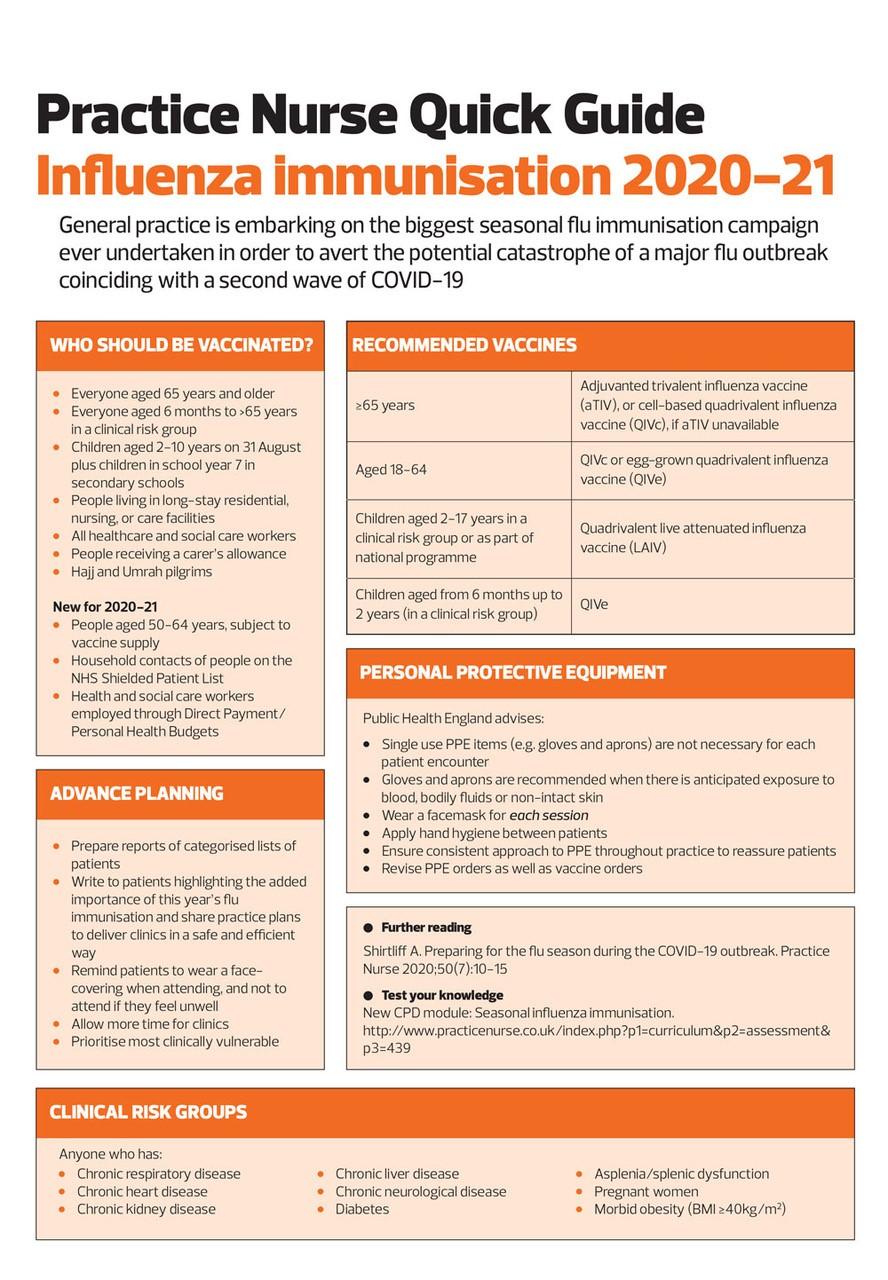Practice Nurse Quick Guide: Influenza immunisation 2020-21
Practice Nurse 2020;50(10):
Practice Nurse 2020;50(10):
General practice is embarking on the biggest seasonal flu immunisation campaign ever undertaken in order to avert the potential catastrophe of a major flu outbreak coinciding with a second wave of COVID-19
WHO SHOULD BE VACCINATED?
- Everyone aged 65 years and older
- Everyone aged 6 months to >65 years in a clinical risk group
- Children aged 2-10 years on 31 August plus children in school year 7 in secondary schools
- People living in long-stay residential, nursing, or care facilities
- All healthcare and social care workers
- People receiving a carer’s allowance
- Hajj and Umrah pilgrims
New for 2020-21
- People aged 50-64 years, subject to vaccine supply
- Household contacts of people on the NHS Shielded Patient List
- Health and social care workers employed through Direct Payment/Personal Health Budgets
RECOMMENDED VACCINES | |
≥65 years | Adjuvanted trivalent influenza vaccine (aTIV), or cell-based quadrivalent influenza vaccine (QIVc), if aTIV unavailable |
Aged 18-64 | QIVc or egg-grown quadrivalent influenza vaccine (QIVe) |
Children aged 2-17 years in a clinical risk group or as part of national programme | Quadrivalent live attenuated influenza vaccine (LAIV, i.e. Fluenz Tetra) |
Children aged 6 months - <2 years | QIV |
CLINICAL RISK GROUPS
Anyone who has:
- Chronic respiratory disease
- Chronic heart disease
- Chronic kidney disease
- Chronic liver disease
- Chronic neurological disease
- Diabetes
- Asplenia/splenic dysfunction
- Pregnant women
- Morbid obesity (BMI ≥40kg/m2)
- Prepare reports of categorised lists of patients
ADVANCED PLANNING
- Write to patients highlighting the added importance of this year’s flu immunisation and share practice plans to deliver clinics in a safe and efficient way
- Remind patients to wear a face-covering when attending, and not to attend if they feel unwell
- Allow more time for clinics
- Prioritise most clinically vulnerable
PERSONAL PROTECTIVE EQUIPMENT
Public Health England advises:
- Single use PPE items (e.g. gloves and aprons) are not necessary for each patient encounter
- Gloves and aprons are recommended when there is anticipated exposure to blood, bodily fluids or non-intact skin
- Wear a facemask for each session
- Apply hand hygiene between patients
- Ensure consistent approach to PPE throughout practice to reassure patients
- Revise PPE orders as well as vaccine orders
FURTHER READING
Shirtliff A. Preparing for the flu season during the COVID-19 outbreak. Practice Nurse 2020;50(7):10-15
Test your knowledge
New CPD module: Seasonal influenza immunisation. http://www.practicenurse.co.uk/index.php?p1=curriculum&p2=assessment&p3=439
Related articles
View all Articles
